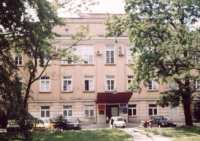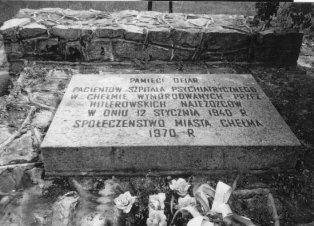Holocaust Education & Archive Research Team |
Euthanasia
Nazi Eugenics & Euthanasia T- 4 Staff T- 4 in Poland T - 4 in Germany & Austria | ||
Liquidation of the Psychiatric Hospital in Chełm
At the time of its liquidation, the psychiatric hospital in Chełm Lubelski contained 450 mental patients - both Poles and Jews (128 women, 304 men and 18 children). Most of them were from the Lublin region. From the beginning of the German occupation the hospital had suffered from very difficult conditions, since the German authorities did not supply sufficient food or medicine. In November and December 1939, doctors decided to release those patients who did not require full time care. This left the 450 patients in the hospital who were very sick. Simultaneously, Bielisch gathered the entire hospital staff and ordered them to immediately leave the premises. Only 12 male nurses were allowed to remain. At that time the chief nurse of the children’s’ department, Nun Cichoslawa was severely beaten by the SS-men because she did not want to leave the children who were in the hospital. In the evening the SS-men started to expel the patients from the hospital building. The Germans ordered the male nurses to take the patients from their beds and lead them to the entrance doors. Several machine guns stood opposite the doors. One was operated personally by Bielisch. The patients were executed immediately at the threshold of the hospital buildings. Those patients who refused to leave voluntarily were thrown out of the windows of the hospital by SS-men and shot. Some patients tried to escape and were killed in the park in front of the building. The biggest problem the SS-men had was with the children. Some of these were hidden in wardrobes by doctors and nurses before the execution; others ran into the building trying to escape. All the children were finally caught and executed. Only one patient succeeded in escaping. The former policeman, Pepik, escaped from the hospital grounds and hid himself in the neighbouring building. After one month he was discovered by the Germans and executed. Four patients survived the execution because male nurses who were in the hospital during the execution claimed the patients were healthy people. The bodies of the victims (some of the people were only wounded) remained in the hospital park the whole of that night. Early in the morning of the following day, SS-men stopped Poles on the street who, by chance, were driving by in horse wagons. They were ordered to transport the bodies to the mass graves. As some of them later described, several patients were still alive when they were buried in the mass graves. At the beginning of spring when the snow had melted, since the bodies were only covered with a thin layer of earth, corpses started to emerge from the water. The Germans ordered local Polish inhabitants to bury them once again. During Aktion T4, the SS used the code “Chelm II” when they sent information about the death of mental patients in Germany to the relatives of the deceased. “Chelm II” was the name of the registry office (for the relatives of those who had died naturally) at which the murdered patients were registered.
Testimonies from the Jewish Historical Institute in Warsaw.
Copyright: Robert Kuwalek H.E.A.R.T. 2006
|

